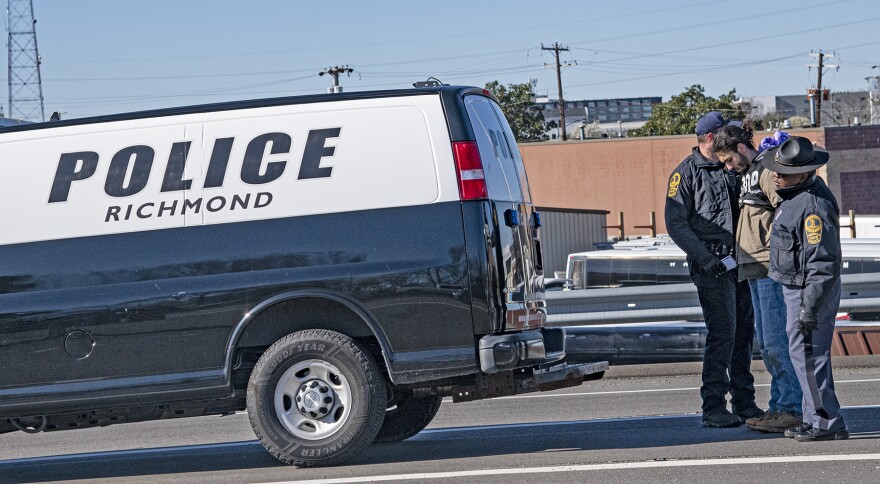Eight of the nine protesters who barricaded Interstate 95 to bring attention to the war in Gaza were found guilty of blocking traffic after nearly 7 hours of witness testimony and arguments Friday. The charge, a misdemeanor, was among four violations they were initially charged with in Richmond City General District Court.
On Monday, Judge Mansi Shah described the March 11 protest as “calculated, planned chaos” that caused “unnecessary harm” to those backed-up three miles on the interstate.
Shah said the five-day jail sentence, plus a $300 fine, was meant to send the protesters a message “not to do this again.” In the decision, Shah noted the difficulty in disengaging the protesters from devices known as “sleeping dragons” — devices used by protesters to lock themselves together or to other objects.
During the I-95 protest, nine people encased their arms in PVC pipe wrapped in duct tape — that were the colors of the Palestinian flag — and then attached themselves to ladders on the interstate.
“What I stand for is the end to war,” protester Naomi “Nomi” Isaac told the court Friday. “I felt there was no other way to make the case heard than to take action in the way that we did.”
Isaac, an organizer with the Virginia Student Power Network and a member of The Black Alliance for Peace, told VPM News they see the Palestinian struggle for national liberation as being intertwined with the struggle for peace being waged by Black and Indigenous people across the world who have been “dispossessed by settler colonies.”
Another protester who was arrested along with Isaac participated in the I-95 event, because, they said, local governments were complicit in the deaths of Palestinians through their donations of surplus tactical gear to aid Israel in the war at the request of Attorney General Jason Miyares.
Counsel for the commonwealth dropped two charges — including unlawful assembly — while the pair of remaining charges were considered during trial Friday.
Shah ultimately dropped the charge for obstructing free passage — but found the protesters guilty of stopping traffic.
Defense attorneys argued that the protesters’ sole purpose for being there was not to impede traffic, but instead to bring attention to the war in Gaza.
“We have no evidence of how those cars stopped,” attorney Caroline Butler argued. “Nothing shows they stopped a vehicle, other than an inference.”

But Shah said that argument was not compelling: “I think the court is entitled to infer logic in this case.”
Defense attorneys also argued that the nature of the protest constituted lawful picketing; the charge was eventually dismissed.
“Typical places of free speech are, in fact, roadways,” defense attorney Katherine Poindexter argued. “Roads — highways — are public places where people can expect to see protest.”
Poindexter also compared the protest to civil rights and anti-war protests from the past — referencing John Lewis’ sit-ins protesting segregation and a Seattle freeway protest the day after four Kent State University students were killed by National Guardsmen in Ohio while protesting the Vietnam War.
Defense attorney Caroline Butler said the protesters’ actions were “necessary and reasonable,” considering that by March 11, over 30,000 Palestinians had been killed in Gaza.
While prosecutor Jennifer Nesbitt agreed the action could be considered “necessary,” she said “it’s unreasonable to block a highway on a weekday during rush hour traffic.”
Several state troopers testified that they received a call about the highway blockage just before 7 a.m. and arrived within about 10 minutes to quickly move the protesters to the side of the highway.
“Some had to be dragged, carried, pushed to the shoulder,” said Virginia State Trooper Jonathan Blitz.
But once on the shoulder, police waited for over an hour for special equipment — and a special team known as a “cut team” — to arrive. One trooper testified that VSP only has one set of the cutting equipment used to remove devices like the sleeping dragons. At the time of the protest, those tools were located in Warsaw, Virginia — about an hour away from Richmond. While there was some discussion among officers of a cut team’s existence within the Richmond Police Department, one trooper testified they weren’t consulted about the issue because state police had jurisdiction.
Attorneys and police testified that some of the protesters released themselves from the sleeping dragons and some had to be cut out of the devices.
The ninth protester pleaded no contest to two of the four charges, including blocking traffic, and was sentenced to one day in jail.



